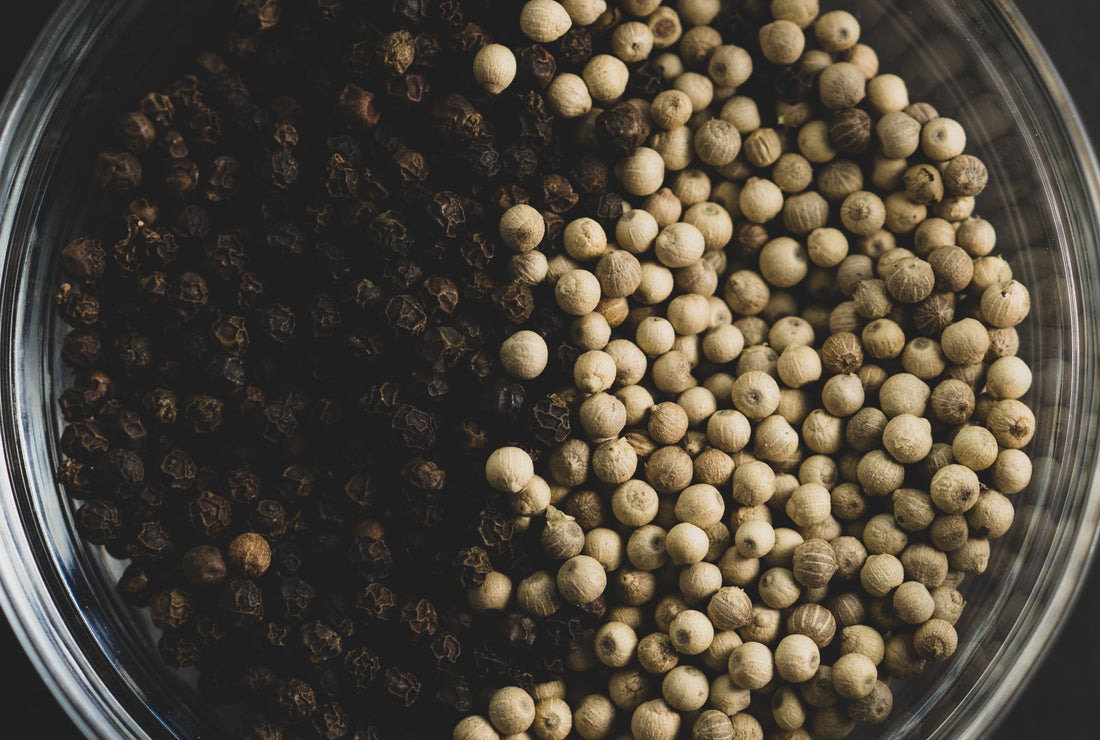
Pepper is one of the most popular seasonings in the world, used to enhance an array of cuisine types. But did you know there are different types of pepper?
Black and white peppercorns both come from the dried fruit of the same plant (piper nigrum). However, they are processed differently to produce distinct flavours that can add the finishing touch to your culinary masterpiece.
You can buy pre-ground pepper or choose whole peppercorns and grind them yourself with a pepper mill. Using a mill allows you more control over the texture of your seasoning and can keep your ingredients fresher for longer.
What is black pepper?
Black pepper is produced from the berries of the pepper plant which are picked just before they fully ripen. The berries are sun-dried, resulting in a black, wrinkled, outer layer.
Once dried, these berries — known as peppercorns — can be ground to provide a flavoursome powder.
Black pepper tends to be more common in American and Western cooking than white pepper. Just think how often it goes hand-in-hand with the salt shaker!
What is white pepper?
White pepper is made from the ripe berries of the pepper plant. Rather than being dried in the sun like black peppercorns, the berries are soaked in water. Soaking removes the outer layer, leaving the lighter-coloured inner seed. White peppercorns can be ground and used in a similar way to black pepper.
The difference

Black and white peppercorns come from the same plant, but what is the difference between white pepper and black pepper when it comes to cooking? Well, the way they are processed gives them unique properties and flavour profiles.
The sun-dried skin of the black peppercorn holds a lot of heat and aromas, leading to a more complex and spicier flavour. White pepper is milder, and its earthy flavour makes it a popular seasoning in Asian and Mexican dishes.
Aside from the difference in flavours, black and white pepper will change your food’s appearance, too. Black pepper makes a great addition to dishes that already have lots of colours. For lighter coloured dishes, such as white sauces or creamy French chowders, white pepper is a popular choice as it blends in.
Studies suggest both types of pepper have health benefits. Both contain piperine, which is anti-inflammatory and high in antioxidants. White pepper contains manganese and iron, while black pepper may help the body absorb nutrients from other foods.
Which one’s best?
Now you know the difference between black and white pepper, you can see that each variety possesses flavours and properties to enhance different cuisine types. However, these are ultimately just recommendations. Which pepper is considered the best is down to personal preference and your individual tastes and cooking styles.
As with all ingredients, quality can affect the flavour of your pepper. So whether you go for black or white, it’s important to consider your source to get the most out of your seasoning. High-quality peppercorns of both types produce more robust and complex aromas and flavours.
White pepper has a shorter shelf life than black pepper, which can be a downside. It tends to go stale more quickly once ground and can also be more expensive to buy.
How to use black and white pepper
In general, if you want a spicier kick, black pepper is a good choice. You might like to use white pepper if you want less heat and an earthier flavour. White pepper is also handy for creamy soups or chowders if you don’t want black specks in your dish.
Black pepper is often added during the cooking process. White pepper is more effective as a seasoning after the meal is prepared, as overheating can make it bitter.
Whether you use black or white pepper in your cooking, buying peppercorns, rather than pre-ground seasoning, ensures your ingredients stay fresher for longer. Once a peppercorn has been cracked or ground, it reacts to oxygen in the air and starts to lose its potency. Using whole peppercorns in a pepper mill means you only grind the amount you need, and the rest stays fresh.
Many pepper mills allow you to adjust the grind, too, so you can decide whether you want a bit of crunch or a fine dusting. Whether you like coarse chunks or a powder-fine dusting, we hope we’ve helped you understand the difference between white and black pepper!

